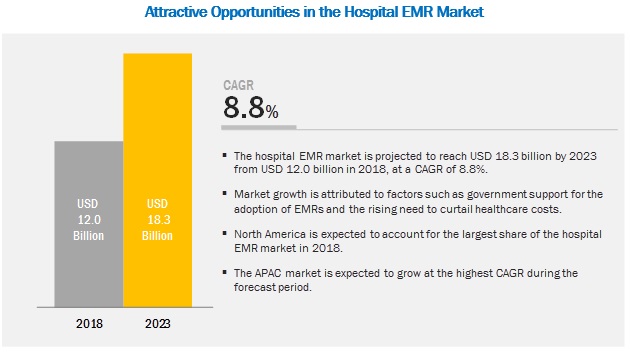The global hospital electronic medical records (EMR) market is valued at an estimated USD 12.0 billion in 2018 and is projected to reach USD 18.3 billion by 2023, at a CAGR of 8.8% during the forecast period.
Growth in this market is primarily attributed to factors such as government support for the adoption of EMRs and the rising need to curtail healthcare costs. However, the high cost of EMR solutions is one of the major factors that is expected to restrain the growth of this market during the forecast period. Various new advancements are taking place in the EMR market.
Download FREE Brochure @https://www.marketsandmarkets.com/pdfdownloadNew.asp?id=253
Currently the focus is shifting towards developing the Smart EHRs using artificial intelligence (AI) and voice recognition technology. Companies like Google and Microsoft are exploring ways to use artificial intelligence and voice recognition to improve patients’ visits to the doctor.
The hospital EMR is segmented on the basis of component, mode of delivery, type, and region. On the basis of component, the hospital electronic medical records (EMR) market is further segmented into services, software, and hardware. The services segment is expected to register the highest CAGR during the forecast period. The high growth of this segment can be attributed to the recurring nature of services such as training and education, installation, consulting, and maintenance services.

On the basis of mode of delivery, the hospital EMR market is segmented into on-premise and cloud-based. The cloud-based segment is expected to grow at the highest rate during the forecast period. This growth can be attributed to the advantages of the cloud-based segment such as low cost of installation and maintenance, unlimited storage of information & easy access to the information at any place, and reduced spam and web threats.
On the basis of type, the hospital EMR market is categorized into general EMRs and specialty EMRs. The general EMRs segment is expected to grow at the highest rate during the forecast period. This growth can be attributed to the multi-function, multi-specialty capabilities of general EMRs enabling their use in various specialties through flexible functioning and incorporated plugins.
Geographically, the hospital EMR market in the Asia Pacific region is expected to register the highest CAGR during the forecast period. Growth in this regional segment is largely driven by various investments and reforms to modernize China’s healthcare infrastructure, the digital healthcare scenario in India, the “One Singaporean, one health record” initiative in Singapore, and the implementation of e-health initiatives in Australia. The key players in the industry are focusing on this region and trying to expand their presence in this region. For instance, Cerner opened Healthe, an on-site health center, at the Manyata campus in Bangalore, India.